Shavkat Mirziyoyev receives credentials from six foreign ambassadors, notes strengthened partnerships
Shavkat Mirziyoyev emphasized Uzbekistan's firm stance that the situation in the Middle East should soon find a fair solution and that lasting peace and stability should be established based on recognized international documents.
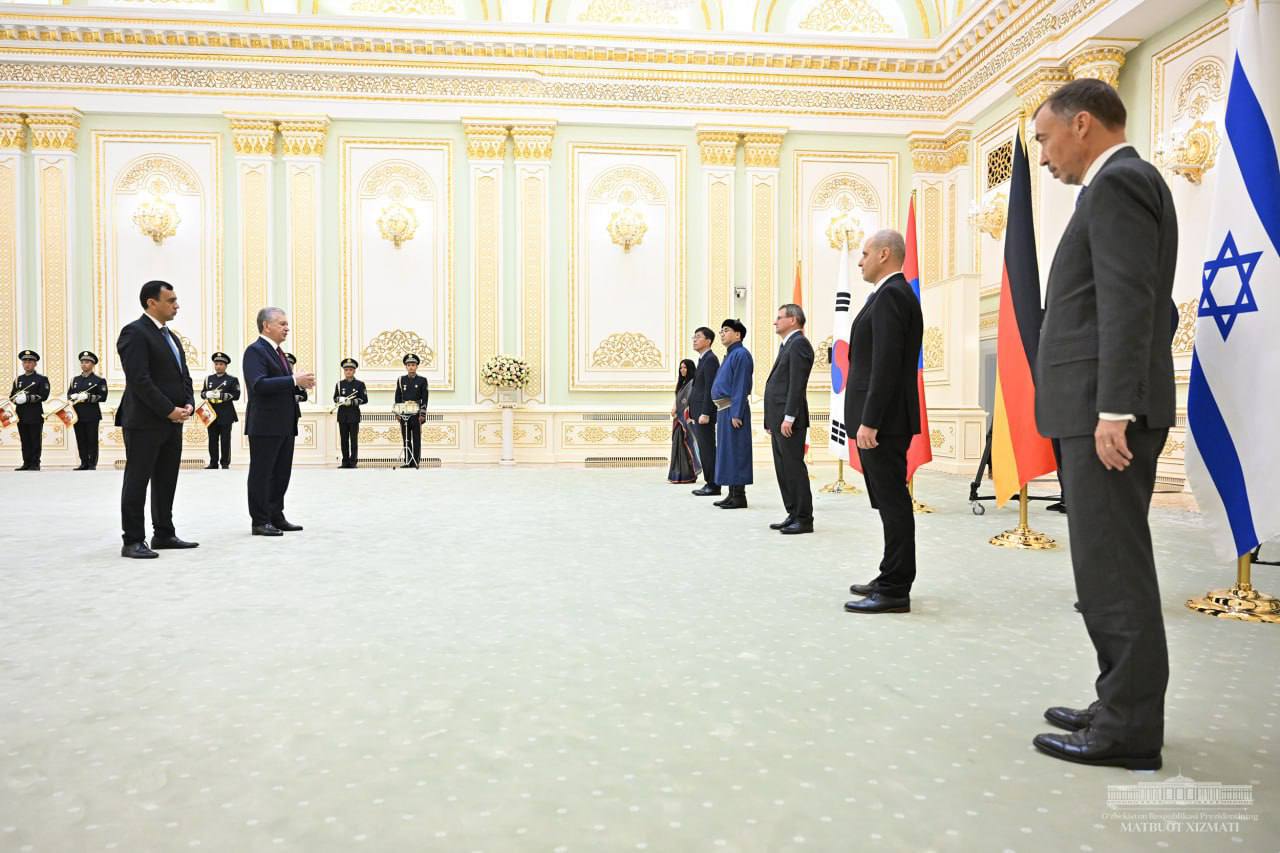
On September 20, a ceremonial event was held where newly appointed foreign ambassadors presented their credentials to President Shavkat Mirziyoyev.
President of Uzbekistan Shavkat Mirziyoyev received the credentials from Smita Pant, Ambassador Extraordinary and Plenipotentiary of India, Won Do Yeon, Ambassador of the Republic of Korea, Daadankhuu Batbaatar, Ambassador of Mongolia, Manfred Huterer, Ambassador of the Federal Republic of Germany, Gideon Lustig, Ambassador of Israel, and Toivo Klaar, Head of the EU Delegation.
The head of state sincerely congratulated the heads of the foreign diplomatic missions on the official start of their honorable and responsible work in Uzbekistan.
It was noted that, in today’s unstable and rapidly changing world, the role of ambassadors is becoming increasingly important, not only in promoting the interests of their countries but also in strengthening the bonds of friendship and cooperation between our peoples.
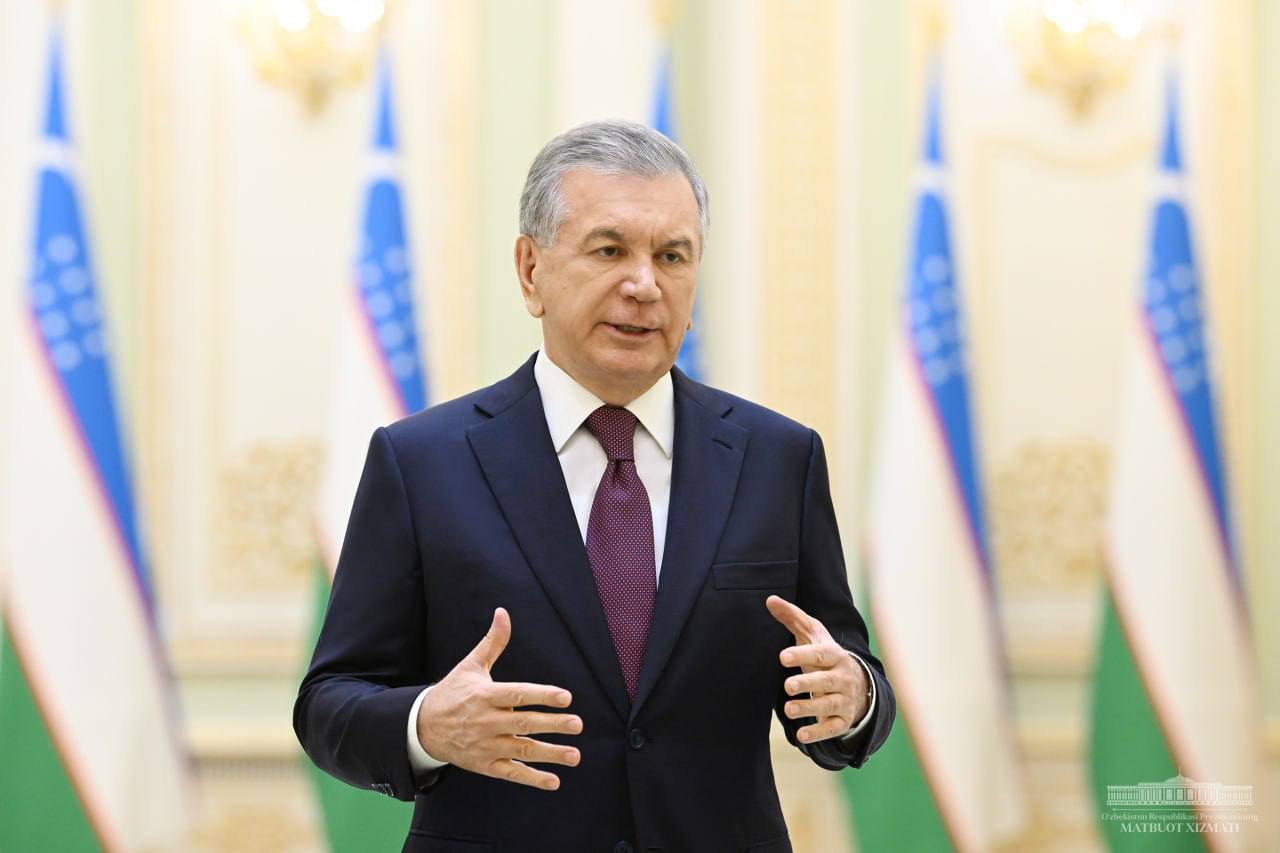
The president highlighted that due to an open, constructive, and pragmatic foreign policy, New Uzbekistan's position on the international stage is strengthening.
The fact that the United Nations General Assembly adopted more than ten special resolutions initiated by Uzbekistan, including four significant ones this year, confirms this.
Despite the complex global situation, Uzbekistan's economy continues to grow, with the World Bank forecasting 5.3% growth this year. According to the IMF, the country's GDP exceeded $100 billion for the first time last year.
The upcoming Paris Summer Olympic and Paralympic Games are expected to showcase the outstanding achievements and records of our young athletes, marking a new era in our country's sports history.
- All of this is the result of our comprehensive and irreversible reforms, - said the president.
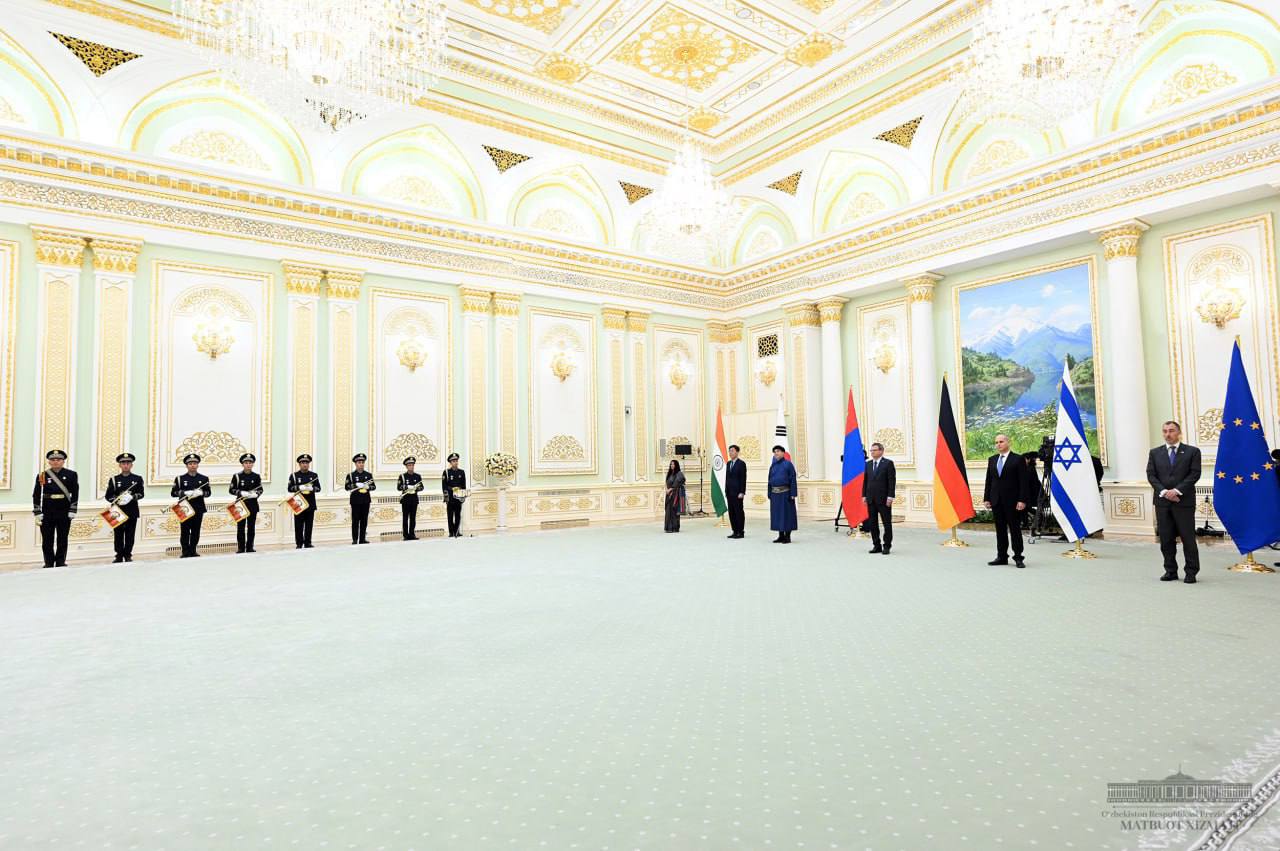
It was emphasized that Uzbekistan will continue its policies under the "Uzbekistan 2030" strategy aimed at building a democratic society, further liberalizing the economy, modernizing industrial and social infrastructure, and creating opportunities for entrepreneurs and investors.
In this regard, the upcoming elections to the Oliy Majlis and local representative bodies, to be held for the first time under the updated Constitution and based on a mixed electoral system, were noted.
Additionally, gratitude was expressed to the governments of the countries represented by the diplomatic mission heads for supporting Uzbekistan's accession to the World Trade Organization.
Addressing India's ambassador, Smita Pant, the president expressed satisfaction that the strategic partnership between the two countries has reached a new level due to the firm political will of both leaders.
Since the beginning of this year, bilateral trade has increased by 30%, the number of joint ventures and flights has grown, and tourism exchanges have expanded, with inter-regional ties developing steadily. Four branches of Indian universities are successfully operating in Uzbekistan.
The head of state emphasized the need to raise mutual trade to $1 billion in the near future. Special attention was paid to expanding practical cooperation in areas such as the digital economy, innovations, information technology, healthcare, pharmaceuticals, the chemical industry, agriculture, transport, and tourism.
It was noted that there are great opportunities for developing inter-parliamentary relations and continuing dialogue within the "India-Central Asia" format.
Uzbekistan's leader pointed out that the Republic of Korea is a close and time-tested friend and a special strategic partner in Asia.
During President Yoon Suk-yeol’s state visit to Uzbekistan, it was agreed to begin a new phase of multi-faceted Uzbekistan-Korea cooperation. A high-tech and innovative partnership model is being introduced to build modern industry and infrastructure in Uzbekistan.
The volume of bilateral trade is $2.5 billion, and more than 700 joint ventures are successfully operating, with the portfolio of new investment projects reaching $10 billion.
Branches of several leading Korean universities, vocational education centers, and innovation and information technology centers have been opened in Uzbekistan, and advanced experience in preschool education is being successfully introduced. Large-scale joint projects in healthcare are also underway.
- The Children’s Clinic built in Tashkent, the Korean House of Culture and Art, Seoul Park, and Seoul Street have become bright symbols of our strong friendship. The Korean diaspora, consisting of almost 200,000 of our citizens, an integral part of our multinational people, is making a worthy contribution to our progress, - the President of Uzbekistan said.
It was emphasized that strategic plans for cooperation with Korea's leading companies in key areas such as critical minerals, semiconductors, the chemical industry, "green" energy, engineering, "smart" agriculture, and transport must be fully realized. Additionally, it is important to further activate inter-parliamentary and inter-regional relations, expand humanitarian cooperation, and develop multilateral cooperation mechanisms.
Addressing the ambassador of Mongolia, the president noted that the recent state visit of President Ukhnaagiin Khürelsükh to Uzbekistan opened a new chapter in mutually beneficial relations.
The Mongolian Embassy in Tashkent has started its operations. Since the beginning of this year, mutual trade has doubled, and contacts between various ministries and agencies have increased.
It was emphasized that agreements must be implemented, particularly the adoption of the Preferential Trade Agreement, participation in the exploration and processing of mineral resources, and the realization of projects in agriculture, livestock, leather, textile, pharmaceuticals, and medicine. Direct flights should be established, and educational and cultural programs expanded.
Strengthening cooperation within the frameworks of the UN, SCO, and other prestigious international organizations was also highlighted.
Shavkat Mirziyoyev emphasized that Germany, a global intellectual and economic powerhouse, is a vital and long-term partner of Uzbekistan in Europe.
The two high-level visits to Germany last year, as well as Federal Chancellor Olaf Scholz’s recent official visit to Uzbekistan, were noted as important events marking a new era in the multi-faceted Uzbekistan-Germany relationship.
In recent years, mutual trade and the number of joint ventures have doubled, and the volume of investments has increased tenfold.
Joint projects worth 9 billion euros are being developed with leading German companies and banks.
Mechanisms for expanding cooperation with companies like Siemens, Linde, BASF, MAN, CLAAS, Henkel, Knauf, Papenburg, and Deutsche Bahn are being implemented, and an Industrial and Technological Cooperation Program has been adopted.
- At the same time, we expect significant results in the cultural-humanitarian, educational, migration, and tourism sectors, - said our President.
Additionally, initiatives aimed at deepening regional strategic cooperation expressed at the second "Central Asia-Germany" summit held recently in Astana were supported.
Mirziyoyev also emphasized that Israel is an important economic partner of Uzbekistan.
Over the past year, trade volume has doubled, and nearly 120 enterprises with Israeli capital are operating in Uzbekistan.
The Bukhara Jewish community, which has long resided in Uzbekistan, continues to serve as a strong bond in our relations.
The president highlighted the vast potential for developing cooperation in innovations, "smart" agriculture and water management, resource-saving technologies, pharmaceuticals, and healthcare.
The head of state reaffirmed Uzbekistan’s firm stance on the need for a fair resolution to the Middle East situation and the establishment of lasting peace and stability based on recognized international documents.
Shavkat Mirziyoyev noted that the European Union is a reliable and time-tested partner of Uzbekistan.
In recent years, relations have steadily developed, reaching a new level. This year marks the 30th anniversary of diplomatic relations.
The number of high-level visits is increasing, strategic partnerships have been established with several European countries, and trade volume with EU countries increased by 30% last year.
Major joint projects are being implemented in "green" economy, alternative energy, high-tech industry, innovations, mineral resources, agriculture, ecology, science, and education.
It was emphasized that the upcoming signing of the Expanded Partnership and Cooperation Agreement will further deepen relations.
- We intend to work together on several important fronts with Europe, including intensifying political dialogue, strengthening democratic institutions, maintaining open and constructive discussions on human rights issues, finding new "growth points" in economic, investment, and transport-communication cooperation, and simplifying visa regimes for our citizens, said the President of Uzbekistan.
Expanding EU cooperation with Central Asia was also noted. In this regard, preparations are underway for the "Central Asia-European Union" summit in Samarkand next year.
After the ceremony, the president wished the newly appointed ambassadors great success in their honorable work. He also recommended that they familiarize themselves with the results of the ongoing reforms and development projects in Uzbekistan, especially by visiting remote districts and villages.
In turn, the foreign diplomats expressed their gratitude for the warm reception and thanked the president for creating favorable conditions for their effective work in strengthening the multifaceted and mutually beneficial cooperation between their countries and Uzbekistan.
Related News
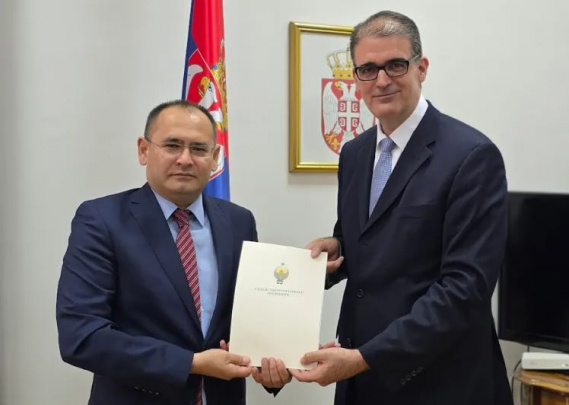
11:27
Uzbekistan's first ambassador to Serbia begins official duties
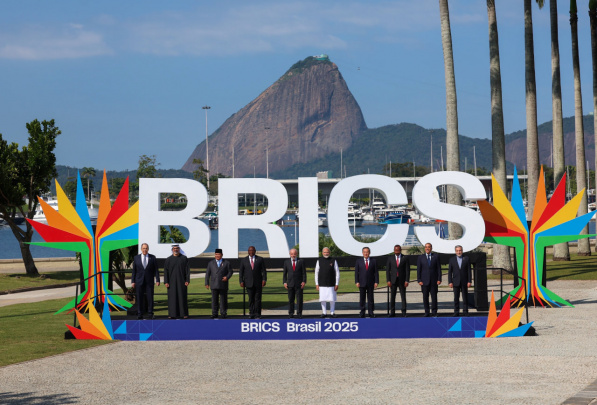
15:16 / 07.07.2025
Uzbekistan becomes a BRICS partner country
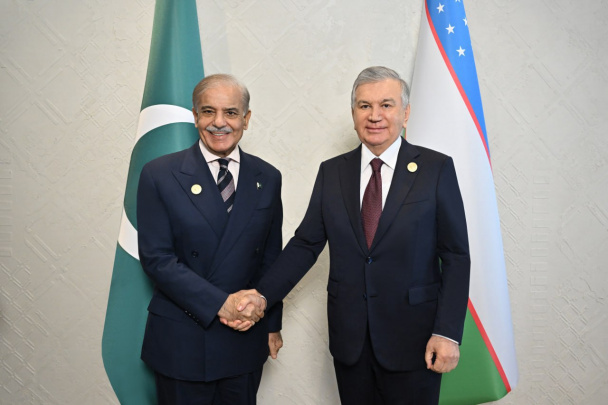
19:04 / 04.07.2025
Shavkat Mirziyoyev holds talks with Shehbaz Sharif, discusses strengthening Uzbekistan-Pakistan strategic partnership
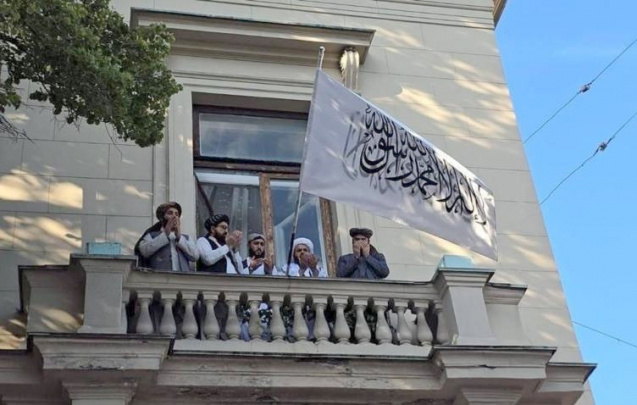
11:49 / 04.07.2025



